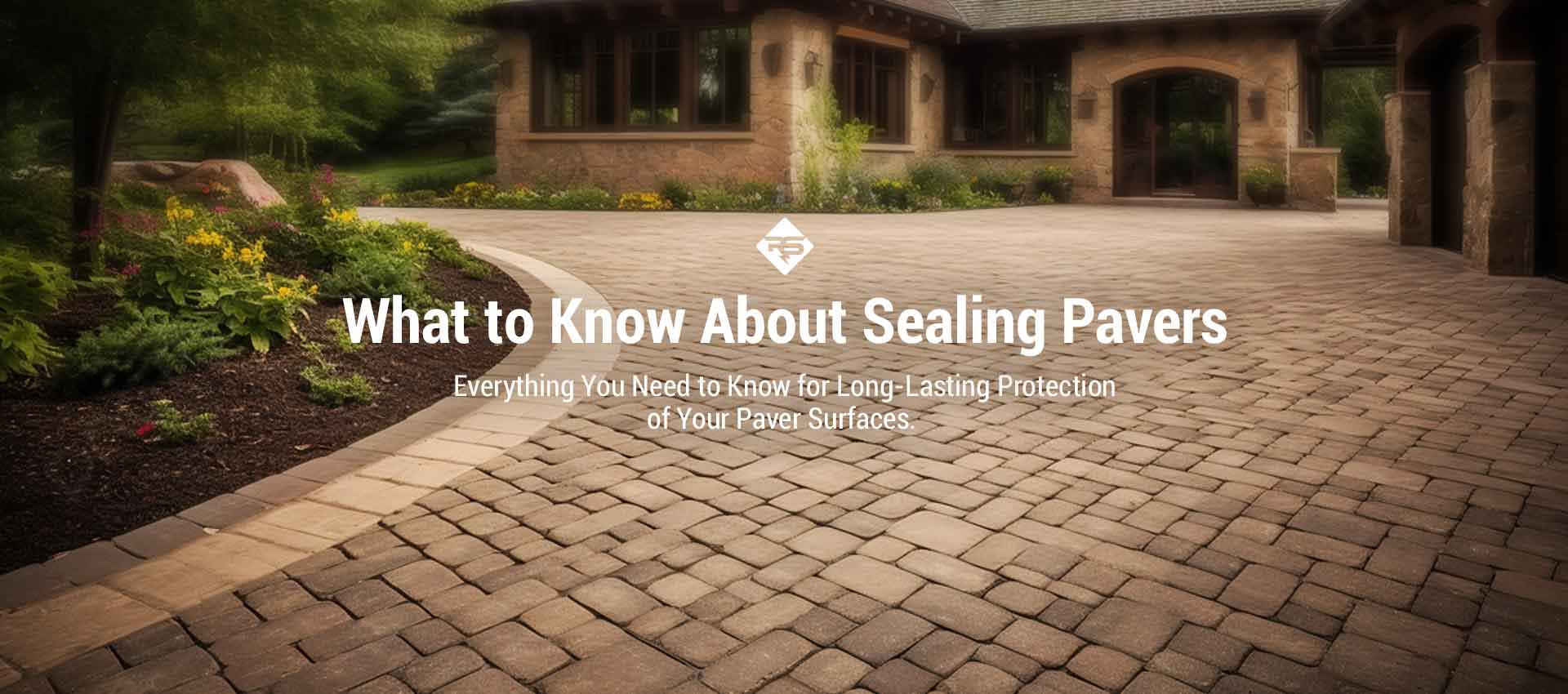Do Yourself a Favor, Seal Your Pavers
Caring for the durability and visual appeal of your paver patio, driveway, or hardscaping starts with prioritizing paver sealing. As a homeowner, you may wonder about the importance of this task amidst your myriad responsibilities. However, investing in the best paver sealer is crucial for shielding your outdoor surfaces from weathering, stains, and deterioration over time. In this guide, we explore the various types of paver sealers and highlight their benefits, empowering homeowners to make informed decisions.
Pavers, Pavers Everywhere
Pavers are an excellent choice for patios, pool decks, driveways, or hardscaping. They are highly customizable, with a wide variety of colors, styles, and patterns to choose from, making it easy to create an outdoor space that perfectly complements the style of your home. It’s not surprising that sales and installation of paving stones in North America are on the rise.
“The ICPI surveys contractors annually and found that between 2020 and 2021, there was a 27 percent average growth in sales. The awareness and use of concrete pavers, paving slabs, and permeable interlocking concrete pavement continues to grow” – World of Concrete
The Benefits of Paver Sealing
Sealing your pavers is an essential part of maintaining the beauty and integrity of your outdoor surfaces. Whether you have a paver patio, walkway, driveway, or pool deck, sealing them can provide several benefits that will help protect your investment and enhance the overall appearance of your home.
- Increased Stain Resistance: Using a high-quality paver sealer will reduce mold growth and help prevent staining caused by leaf tannins, grease, tire marks, and more. Sealing your pavers will make it easier to clean spills and maintain aesthetics.
- Enhanced Protection: Exposure to UV rays, water, and salts can quickly deteriorate your pavers causing pitting, cracking, and dusting. A good paver sealer will prevent damage and add years to their service life.
- Decreased Drying Time: Properly sealed pavers do not allow water to be absorbed. This significantly reduces drying time. Pavers that dry more quickly are less likely to support mold and algae growth.
- Increase Durability: Paver sealing can help protect them from freeze-thaw cycles. Water expands when it freezes, this expansive force causes paver surfaces to spall.
- Effort and Cost Savings: Although it requires initial effort, sealing pavers reduces long-term maintenance needs and costs, making cleaning easier and extending the lifespan of your outdoor surfaces.
- Increase Resale Value: Well-maintained pavers can add value to your home and make it more attractive to potential buyers. paver sealing is one way to help ensure they remain in good condition, which can increase the curb appeal of your home.
- Reduce Maintenance: Prevents deep absorption of water, dirt, and other organic contaminants. Sealing significantly reduces the need for frequent cleaning, saving you valuable time and effort on annual upkeep.
Maintenance Costs
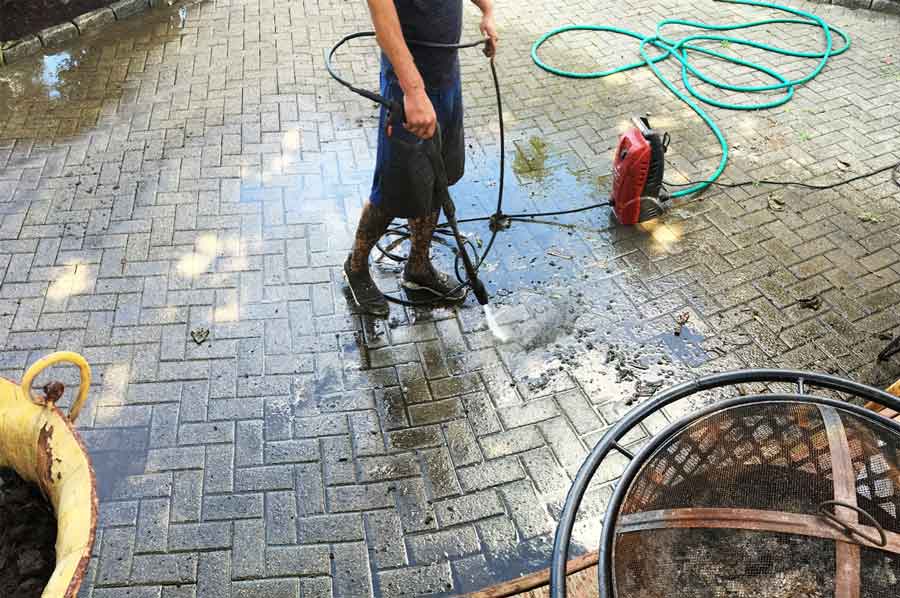
Pavers and hardscapes are known for their ease of installation, durability, and pleasing aesthetic to any landscape, driveway, walkway, and pool area. However, keeping that “good as new” look can often be an annual and laborious task. Lichen, mold and mildew growth, efflorescence, dirt, grime, red clay stains, oil, grease, acid rain, snow, ice, salts, and deicing chemicals will not only dirty the surface, but expedite deterioration. This makes frequent cleaning and maintenance necessary.
If you do not own a pressure washer, you are stuck having to rent one each season. The average cost to rent a gas-powered pressure washer for a day will run you close to $100. If you use chemical cleaners beforehand that can cost an additional $20-$50 per gallon. Not to mention water usage, rags, buckets, brooms, and your time.
Or, are you one to hire a professional pressure washing company to do the job? If so, pricing can range from $100-$500 depending on square footage. Either way, you slice it, when it comes to keeping your personal sanctuary looking like new, the money can add up!
Good news! Applying a good paver sealing product will save you money and labor when it comes to maintaining your paver patio, pool deck, walkway, or driveway.
What to Look for in a Paver Sealer
There are several types of paver sealers on the market. When the time comes to choosing the best paver sealer, there are several things to look for. Be sure that the product you choose offers the following:
Slip Resistance: Sealing your pavers should not increase the risk of slips and falls. Avoid topical sealers for patios, pool decks, and driveways. Wet-look paver sealers and high-gloss paver sealers, for example, form a thin coating that is very slippery when the paver is wet. Instead, choose a penetrating sealer that soaks into the paver and seals it inside. Penetrating sealers do not make surfaces slippery.
Durability: Sealing pavers and other masonry is not something that should be done frequently. If you choose a good sealer, your pavers will be protected for many years. When it comes to durability, a penetrating sealer is the optimal choice. Topical sealers, wet-look sealers, and high-gloss sealers cannot stand up to heavy traffic. The coating quickly wears away, leaving your pavers vulnerable.
UV Resistance: Paver patios and hardscaping are exposed to the sun’s damaging UV rays. When choosing a paver sealer, be sure that the sealer can tolerate sun exposure. Acrylic sealers are particularly vulnerable to UV rays. Although many brands say that they are “non-yellowing”, this is not an impressive claim! You should expect any sealer designed for outdoor use not to turn yellow. UV rays will cause acrylic to break down and become dull because acrylic is not UV resistant.
Easy Application: The days of debating water-based vs. solvent-based paver sealers are a thing of the past. Sealer chemistry has advanced to the point that solvent-based sealers no longer provide a real advantage over water-based sealers. Why bother messing with highly flammable paver sealers that require special equipment and safety precautions? Water-based sealers are not flammable, have no odor, and are safe for people, plants, and pets.
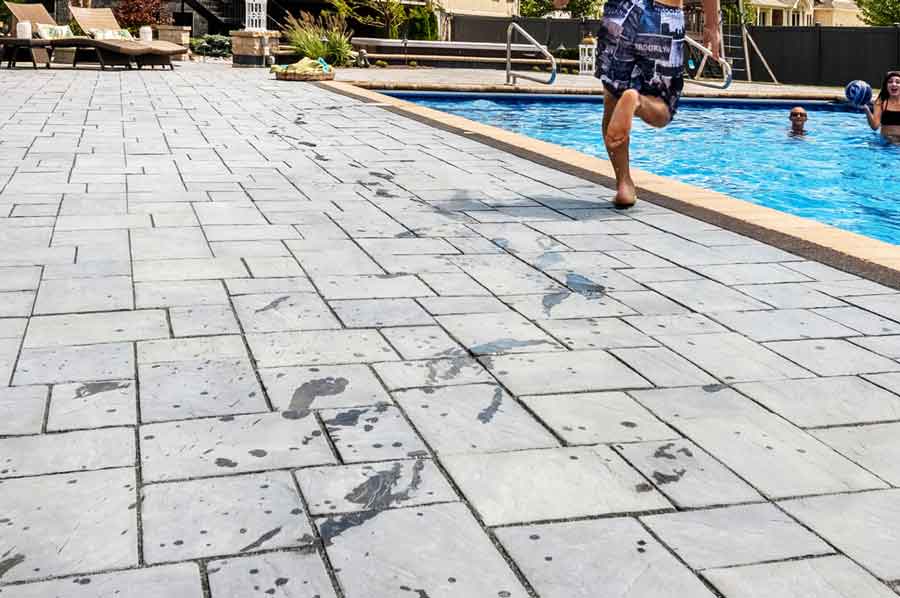
What About “Wet Look” Paver Sealers?
Initially, the allure of acrylic “wet-look” paver sealers is undeniable. The glossy finish they impart to outdoor surfaces can enhance the appearance of pavers and brick, giving them a vibrant look. However, the appeal of these sealers often fades as quickly as their glossy sheen.
One significant downside is their tendency to wear away rapidly, especially in high-traffic areas or under harsh weather conditions. Consequently, reapplication becomes necessary every 1-2 years, leading to increased maintenance efforts and costs over time. The frequent need for reapplication makes them a less cost-effective option in the long run compared to longer-lasting penetrating sealers.
Furthermore, while they provide some level of protection against moisture and stains, they often fall short of offering comprehensive protection against UV rays and other environmental factors.
Another drawback is their tendency to fade unevenly, resulting in patchy or blotchy areas that detract from the overall appearance of the surface.
These limitations underscore the importance of carefully considering the long-term implications before opting for wet-look paver sealers, as they do not provide the durability and value they advertise.
Choose from the Best Paver Sealers Available
We’ve done the hard work for you! After 25 years of manufacturing concrete and masonry sealers, we understand that performance is king. Our paver sealing options for patio pavers, driveways, and pool decks, provide premium protection in easy-to-apply, water-based formulas.
LastiSeal Brick & Concrete Sealer is the best sealer for this task. Its specialized formula lasts longer than silane & siloxane sealers, and as a bonus LastiSeal hardens as it cures, strengthening pavers as it seals them. If LastiSeal is outside your budget, our PaverArmor – Penetrating Paver Sealer is an excellent second choice. A highly concentrated silane and siloxane blend that gives you 10 years of protection in a single application.
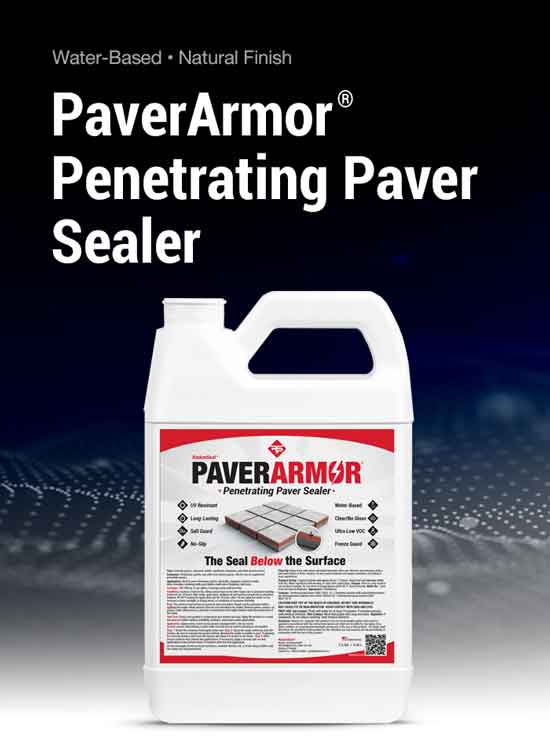
Get It on Amazon
Buy Direct
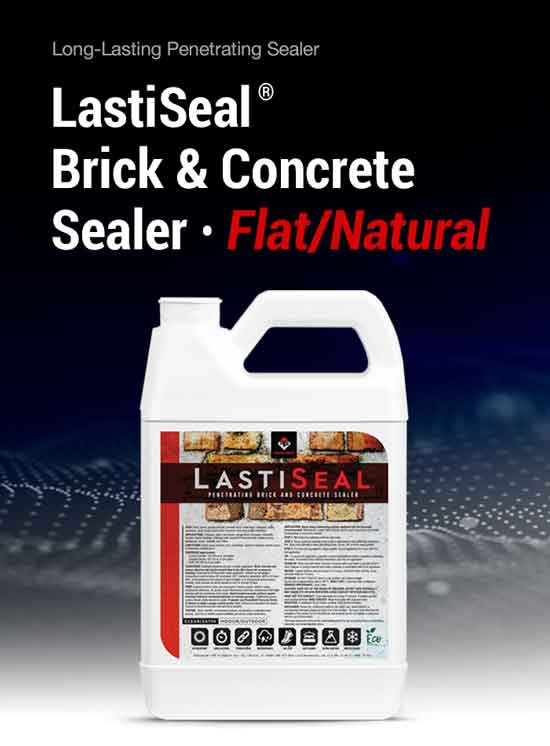
Get It on Amazon
Buy Direct
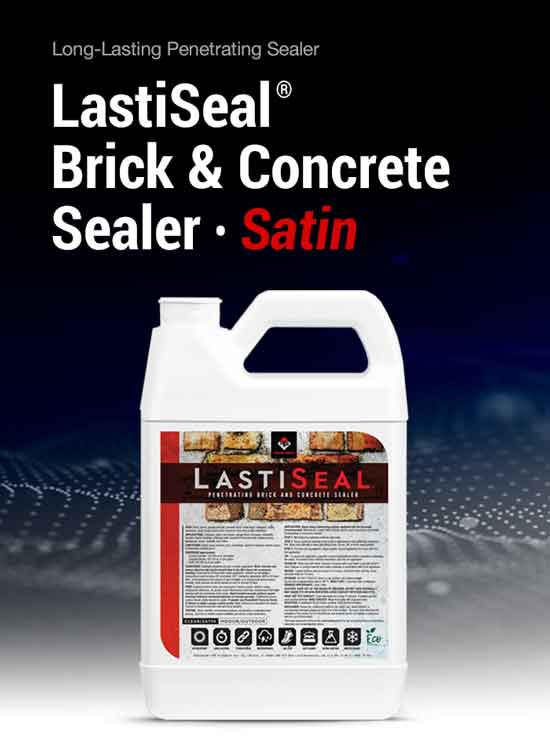
Get It on Amazon
Buy Direct
Paver Sealing Should Start With a Clean Surface
Cleaning pavers and bricks thoroughly before applying a sealer is essential for ensuring optimal sealer penetration, adhesion, and effectiveness. BrickTastic Brick & Paver Cleaner is the best choice for this task. Its specialized cleaning formula penetrates deep into the pores, removing dirt, grime, and stains without damaging the surface. By preparing your paver and brick surfaces with BrickTastic, you create a clean, pristine foundation that allows the sealer to absorb properly, resulting in long-lasting protection and enhanced aesthetics for your outdoor surfaces. Trust BrickTastic for unparalleled cleaning performance and superior results.
Not All Pavers Are Created Equal
Pavers are known for their durability and when compared with poured concrete slabs, they can hold up better even under extreme inclement weather conditions. While they are relatively easy to maintain, not all pavers are created equal and problems persist!
There are many different manufacturers and paver composition varies. The types of pavers generally fall into three categories; brick, concrete, and natural stone. Shape, texture, and color vary widely amongst each type. One can also incorporate more than one type of paver to achieve a particular design. Which paver to choose from greatly depends on the project at hand, personal taste, and budget.
- Clay Brick Pavers – Considered the most elegant type of paver. They are fairly stain-resistant and tend to resist color fading better when compared to concrete pavers. Can be installed in a variety of patterns. Easy to install, but commonly more expensive to have installed. Brick is a very durable material.
- Concrete Pavers – Popular for commercial projects and becoming more popular for residential applications. Comein various colors, shapes, and sizes. Have a high compressive strength (8,000 psi). Hold up much better against deicing chemicals, and absorb less water (5%) compared to standard concrete (7–9%). Strength and porosity vary amongst manufacturers. Color fades under UV rays and surface traffic.
- Stone Pavers – Broad term for different types of stone pavers; limestone, granite, bluestone, slate, and flagstone are popular choices. The natural look makes them popular for outdoor landscapes. Understand the most extreme weather conditions. Cracking, pitting, spalling, and surface deterioration are of little concern.
When Using A Paver Sealer, Porosity Matters
Pavers can also be differentiated between permeable, pervious, and porous. While there is a compositional difference, the terms generally describe materials that allow water to penetrate the surface (important when directing stormwater, reducing freeze-thaw). The truth is, that surface porosity varies greatly, and when it comes to choosing a sealer, porosity matters!
Manufacturing techniques come into play. Chemical additives often used in the mix reduce porosity (e.g., added polymers are used to protect colorants, add strength, and increase density). This can potentially interfere with the absorption of a penetrating sealer. Causing the sealer to build up on the surface, change friction, and potentially appearance.
When a penetrating sealer is unable to be used, there are other options to choose from. High-gloss finish sealers or topical-type membrane coatings can be used; acrylic, polyurethanes, clear epoxy, and waxes. However, not all of these sealer options are suitable for all situations! There is more upkeep and a need to reapply clear topical sealants.
Knowing the type of pavers you have is crucial when selecting a sealer. You can review our Sealer Guide for quick reference, but knowing the type of pavers will help answer such an open-ended question. Certain pavers are inherently more accepting of a penetrating sealer than others. These include:
- Brick
- Concrete
- Limestone
- Sandstone
- Travertine
- Adobe
- Mexican (unglazed)
- Bluestone
- Lannon
Pavers that often vary in surface porosity:
- Marble
- Flagstone
- Fieldstone
- Granite
Seal Your Pavers Today and Save Tomorrow
Sealing your paver driveway, pool deck, paver walkway, or fire pit may not be high on your home maintenance list, but it should be mentally noted! The potential issues with the pavers themselves; shifting, sinking, unevenness, puddling, and shoddy installation are common complaints early on.
If you were fortunate enough to purchase a home with a paver area already installed know that paver installation is not cheap! Problems eventually will arise and although they may not be present early on, they can be expected.
Applying RadonSeal Paver Sealer to your pavers is an easy and relatively inexpensive solution to protecting your investment for years to come. It does not take a lot of common sense to know that by sealing out the elements and improving strength, your paver sanctuary will keep looking “good as new” for years to come!
Interested in adding some color to your pavers? Check out our guide on Staining & Sealing Your Patio The Right Way
